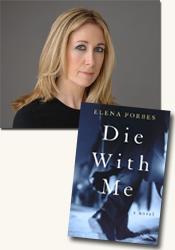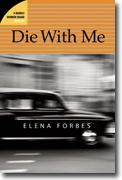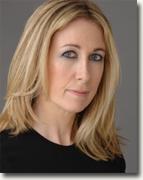author interview
book reviews:
· general fiction
· chick lit/romance
· sci-fi/fantasy
· graphic novels
· nonfiction
· audio books
· author interviews
· children's books @
curledupkids.com
· DVD reviews @
curledupdvd.com
newsletter
win books
buy online
links
home
for authors
& publishiss
for reviewers
The maga Portunista and her colorful subcommanders lead a ragged, outnumbered brigade in the wake of an international war, against her increasingly ruthless adversaries. But the ambitious commander finds herself irreconcilably drawn to a charismatic, kind and hopeful stranger. Click his e for more on Cry of Justice or read our review.
|
|||||
 
Michael Leonard interviewed author Elena Forbes about
her novel
Die With Me Interviewer Michael Leonard: How did you come to write Die With Me Elena Forbes: The book really evolved from the first scene, and then just grew and grew. I was interested in the general subject of Internet chat rooms and the way people hide their identities. I had also been reading a lot about suicide pacts between strangers who meet up on the web and about teenage depression and suicide. I suppose I just combined these various elements. The book is a terrific new example of the mystery cum police procedural genre. What were some of the challenges in writing your first novel? The main challenge was making sure that the procedural side was as accurate as possible within the confines of fiction. I spent a great deal of time on research with a number of contacts from the Metropolitan Police and the Forensic Services to make sure that the details were as accurate as possible. The first chapter with its eerily gothic atmosphere really sets the stage for what is to come as "Tom" meets and seduces Gemma Kramer in St. Sebastian's. Where did you get the idea for this scene and why set it in a church? The idea for the opening chapter came from a visit to the churchyard at Haworth, in Yorkshire, where the Brontes used to live. It was a lovely, hot, sunny day in mid-July and I had spent a good hour or so visiting the Bronte house and museum and then walked out into the sunshine into the churchyard beyond. Even on a sunny day, the graveyard is quite dark and gloomy, the whole area shaded by a number of tall trees. I was struck by the melancholy of the setting, set high up on the hill, above the houses, with an open expanse of moorland just behind. In winter, it must be a cold and bleak place, with a bitter, driving wind coming down off the moor.
I wanted Tartaglia to have a mentor, someone whom he respected and listened to. Clarke in a way represents old-style policing, the way it used to be maybe ten years ago before the mania for form-filling and paper-pushing took over. He is someone who still understands the important of ‘gut feel’ and ‘instinct’, unlike Steele, and he also respects Tartaglia in return. Mark and Sam Donovan seem to both be pretty dedicated. They also seem to be emotional mirror images of each other. When faced with Gemma Kramer's death, do you think their mission to find the killer turns personal? I never saw their attempts to track Gemma’s killer as a personal crusade, although they are both deeply moved by the tragedies they see along the way and are determined to find the killer. They are both professionals, although what happens in the end will touch both of them more than they can possibly imagine and will haunt them long after the case is solved. These elements will go forward into the next book, which takes place in the aftermath of Die With Me The story has a mixture of strong and weak women. You make a point of portraying the teenage girls Gemma, Ellie, and Laura as emotionally fragile, depressed and suicidal, yet Fiona Blake and even Sam are portrayed as strong and independent, and refuse to let men boss them around. Was this contrast intentional? What were you trying to show here? I didn’t deliberately think of the women in the book falling into two distinct camps; they just evolved that way for a variety of reasons. Anyone who is going to be vulnerable to Tom’s manipulative character is going to be naïve and fragile, and desperate for something that they think he can give them. In a way, age is less important than personality. This is something he is very aware of and exploits to the full.
When DCI Carolyn Steele arrives to head up the team, Mark is sort of pushed out of joint. Why? And why does he have such animosity toward forensic pathologist Patrick Kennedy? Is it more than just a professional disagreement over the question of Marion Speer's suicide? Tartaglia does have a bit of an ego; he has pride in what he does and he was doing a good job before Steele was brought in. In Tartaglia’s place, having been given a potential career break, I too would resent someone being parachuted in over my head! It’s natural that he is not going to be entirely reasonable about it. Also, Steele is the antithesis of Clarke and it appears to Tartaglia that she lacks judgment. However, Clarke’s view of her is more balanced; he can see the other side and understands how Tartaglia’s exacting nature is making things worse than they might be.
What is the nature of Mark and Fiona Blake's continuing difficult, tentative relationship? Tartaglia finds himself attracted to impossible, emotionally unavailable women whom he finds mysterious. The lack of availability is a challenge as well as a puzzle, particularly in Fiona’s case. However, his ego will not allow him to play second fiddle to anyone, which is why he ends the relationship when he discovers that she has another lover. However, he still finds her incredibly attractive and he is torn. The idea of these suicide pacts is interesting and is a theme that is developed as a serious subplot throughout. How did you come across this, and why did you decide to use it in the story? Suicide pacts via the Internet between strangers are a growing phenomenon, and there are a number of so-called ‘suicide’ websites where you can talk to other like-minded people and get advice on how to kill yourself. I watched a very interesting documentary about the situation in Japan, which is more developed than in the UK, and then started to pick up on it in the UK papers. I can imagine how the wrong sort of person could be attracted to such places, where people are very vulnerable, and could easily manipulate such a situation. Realizing that Harry Angel may know more about Marion Speer than he is actually admitting, Mark becomes convinced that he may be the murderer. Do you think he is jumping the gun a bit in his resolve to solve the crimes? The problem is that at this point in the story they have very little to go on and a number of things point to Angel being involved, although they have no concrete evidence other than the fact that he was in the vicinity and that he lied. The pressure the press puts on the police to solve crimes quickly is enormous, and anybody who is remotely suspicious must be looked at.
Again it’s partly a hunch about the killer’s MO, that he has a thing about high places. Marion Spear also died a few streets away from Gemma Kramer, and although she is older, personality-wise there are similarities that they discover. When trying to link a series, patterns do vary and there is enough that is similar to make it reasonable not to rule it out, whatever Kennedy says. That fact that Kennedy discounts it so completely is also enough for Tartaglia to think it’s worth pursuing, and Clarke backs him up. The emails that Carolyn receives from "Tom" after her report on Crimewatch begin to affect her in surprising ways. What do you think this tells us about her character? Carolyn Steele is quite a closed person emotionally. She likes everything to be orderly and she likes to be in control. However professional she is, when the emails start to arrive, she can’t control either them or her feelings about them. She behaves like any normal woman would who lives on her own and who is being stalked. Although she tries to keep her fear under wraps, gradually she starts to lose it. Sam and Mark are obviously a team; Mark doesn't hit it off with Carolyn; Superintendent Cornish is a career police bureaucrat; and no one can stand Patrick Kennedy. Why did you include so much inter-departmental bureaucratic wrangling? I put it in because it’s a part of life and the Metropolitan Police is no different. The stresses of handling a high-profile case in the full glare of the public eye must be amazing, and such pressure brings out both the best and the worst in people. Why did you embrace so much back-story of the characters' personal and interior lives? Back-story is an essential part of what makes somebody who they are and psychologically I find it interesting to show some of this to the reader. For example, if we didn’t have some of Tom’s back-story, his actions would, I believe, be far less interesting. Personally, I’m as much interested in the ‘Why’ as the ‘Who’ in crime fiction and without some understanding of why people do things, you’re left with a series of actions that have far less depth. How difficult was it to keep shifting the narrative from the team's investigation to the killer without ultimately giving too much away about the killer's identity? I felt it was very important to have Tom’s point of view, which adds complexity to the whole. I also found him an interesting character to write about and, knowing what he is like, understanding why he does what he does, make it more interesting for the reader. The fact that the reader is several jumps ahead of the police, knowing what he has in mind, is no bad thing. He may, or may not, get away with it. The outer edges of London, the suburbs of Shepherd’s Bush and Ealing, provide much of the setting. What drew you to set the story in these areas? And how do you think this area of the city adds to the overall atmosphere and suspense of the novel? I know West London very well and, although it is a cliché to say so, London really is a series of villages, each with quite a distinct character. Most people live in the suburbs rather than the centre of town, and it was important to the story that what came across is real. Power and the idea of manipulating the vulnerable seem to lie at the core of the novel, particularly with regard to the teenage protagonists. Without revealing too much of the plot, can you talk about how those with disturbing agendas can control those who are vulnerable in our society? It’s really very easy with the Internet where there is no face-to-face contact, no normal checks and boundaries. Email and chat rooms can be incredibly seductive and addictive even to adults, and the way a pedophile grooms a young child by pretending to be something he isn’t is no different to what Tom does. I find it extraordinary that people who might feel instinctively wary if a stranger stops to talk to them in a street are happy to divulge the most personal details and feelings over the 'Net, and they are easy prey to the wrong person. The novel has a dark, sinister and edgy feel to it, and it reminded me a lot of Helen Mirren's Prime Suspect or even Val McDermid's The Wire in the Blood series. If the book were optioned for a movie or a TV series, do you have any ideas on who would play the main characters? That’s a really tricky one! I have a very strong mental image in my mind of all my characters, and they would be very difficult to cast with real people, particularly Tartaglia. The magic of a book is that each reader has their own view of what a particular character looks like, and no two readers see it the same way. Hence often the disappointment when a book is made into a TV series or a film. Can you tell us a bit about the sequel you are writing and which of the characters may be returning? The sequel takes place three months later, in the aftermath of Die With Me Now that you've published your first novel, do you have any advice for writers, especially would-be crime writers who are just starting out? My main advice would be to read and read good crime fiction, and then to write and write your own. Also, don’t expect it to be perfect to start with, just get something down on paper and also try and stick to a regular writing routine. Don’t be put off if your first book is turned down - keep at it. Most published writers’ first books are usually their third or fourth. Die With Me Elena Forbes has lived most of her life in London. After reading Modern Languages at Bristol University she worked as a portfolio manager for international investment banks. She now writes full time and lives in Notting Hill with her husband and two children. The first chapter and synopsis of Die With Me Michael Leonard is a contributing reviewer to curledup.com. His interview with Elena Forbes was written in conjunction with his review of Die With Me. © Michael Leonard/2008.
|
|||||
| fiction · sf/f · comic books · nonfiction · audio newsletter · free book contest · buy books online review index · links · · authors & publishiss reviewers |
|
| site by ELBO Computing Resources, Inc. | |


